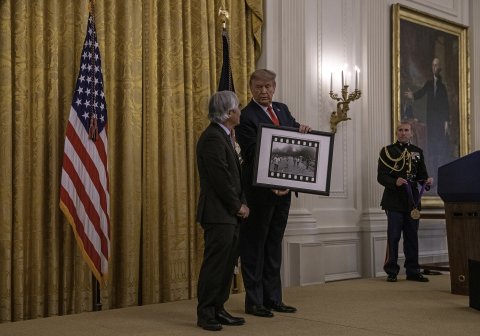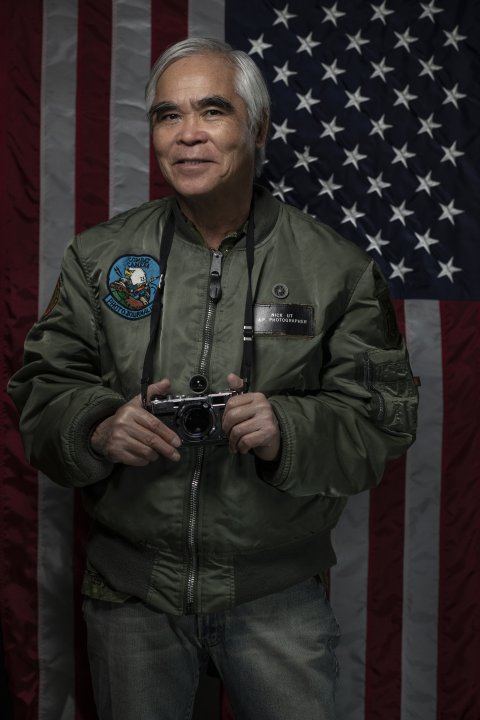The day before photographer Nick Ut was scheduled to receive the Medal of Arts from Donald Trump, another famous soon-to-be medal recipient publicly declined the honor: Bill Belichick, head coach of the New England Patriots and long-time friend of the president. Belichick, who was scheduled to receive the Presidential Medal of Freedom the same week that Ut was to be honored, cited the "tragic events" of the Capitol riot as his reason for turning down the award.
Ut, however, was undeterred.
Born in Vietnam and a photographer for AP for more than 50 years until his retirement in 2017, Ut saw the medal ceremony as a highly personal, not political, moment and a capstone to his long and storied career. While he is most famous for his Pulitzer-Prize winning photo of children fleeing a napalm attack—the picture, with a young naked girl screaming in pain at its center, helped change public opinion of the Vietnam War—Ut has also covered wildfires, riots, Hollywood celebrities (a photo of a crying Paris Hilton also became iconic), the O.J. Simpson trial, the Olympics and the Pope. Here is the story of his decision to move ahead with accepting the medal from Trump, despite some friends advising him otherwise, in his own words, as told to Newsweek senior editor Jenny Haward.
When I was first told that President Donald Trump wanted to award me the National Medal of Arts in the White House I was very excited, I think my reaction was: "Oh my god!" Originally, the award was going to be given last March, but the ceremony was postponed because of the COVID-19 pandemic. Then, I was called last month and told it had been rescheduled to January 13.
My photographer friend Mark Edward Harris and I arrived in Washington, D.C. on January 11, walked around the Capitol and took some pictures. I took some shots of the National Guard and of flowers that had been left to honor the police officer who died. It was a beautiful shot.
I have covered many riots and protests, including riots in LA in 1992 after Rodney King was beaten and the policemen responsible were not convicted and last year's Black Lives Matter protests. They can be dangerous, but I've also covered the Vietnam war with people shooting at me so I know how to be careful, even though I was wounded three times. I was very sad to see the riots at the Capitol on TV on January 6, although I do wish I had been there to take pictures. Protests should be peaceful and this one was too violent. When you protest you don't have to kill people.
I didn't watch the Trump rally before the riots and I'm sure a lot of people are very upset with me for accepting the medal. But it's my personal life. I'm an old man now, so I'm happy the president gave me an award. I wanted to be here. For me, it's more about receiving an award from a president.
There was a meet and greet before the Medal of Arts ceremony, and the president looked happy and congratulated me. He was talking about my "Napalm Girl" picture and saying that he was so happy I was there. I gave the president a picture of "Napalm Girl" and I told him that I had signed it and that Phan Thi Kim Phuc—everybody knows her as Kim Phuc—had signed it too. I told him that Kim wanted to see him but that she was in Canada and could not come because of COVID-19. He was very excited when I gave him the picture.

During the ceremony, Trump gave a speech about the importance of photography, and how I had made the journey from Vietnam to Hollywood and photographed celebrities. When he placed the medal around my neck, it was the happiest moment of my life. I couldn't believe the president of the United States was giving me a medal. Everyone was applauding and congratulating me. He actually then asked an assistant to go and get the photo I had given him from the other room and showed it to the crowd.
I hadn't heard then that the President had been impeached for a second time, I just wished him good luck. I have many friends who called me and told me not to come here, they thought it would be dangerous, especially with COVID-19. And I'm sure that in the next few days I will receive a lot of messages about accepting the award. But I don't mind if anyone is angry because the award is for me personally, and it is from the President of the United States. He's still the president. And this is America. We have freedom here. I never forget that.
I actually met Donald Trump in Los Angeles before he was president, he loved my picture of Vietnam. He said to me: "Nick, your picture changed the world." He was talking about my "Napalm Girl" picture. I took that photo when I was on assignment for the Associated Press (AP) in Trảng Bàng during the Vietnam War. My older brother was an amazing photographer, he was a Vietnamese movie star and was one of the best photographers in Vietnam. When I was 14, he told me that he wanted me to become a photographer. So when my brother was killed in a Viet Cong overrun in 1965, I said to myself, "what am I doing with my life?" My sister-in-law had an idea to call the AP for a job but they said I was too young. Then, a month later they called me and gave me a job.
Years later, early on the morning of June 8, 1972, at around 8 a.m., I arrived at the village of Trảng Bàng and stayed there for a few hours taking photographs. Just before I was going to head back to Saigon, I saw the plane drop four napalm bombs on Trảng Bàng. I had never seen napalm exploding so close.
I didn't think there was anyone in the village that morning but then I saw people running up Highway 1, carrying dead bodies of children. I began taking pictures and then a few minutes later I saw a girl—Kim Phuc—running with her arms out. My first reaction was wondering why she wasn't wearing any clothes, but as I ran closer to her while taking pictures, I could see how badly she was burned. I knew she was dying, so I put water on her immediately to try and help her, and then drove her to a local hospital almost 40 minutes away. But they told me they had so many wounded people they couldn't help and urged me to take Kim and the other wounded children to Saigon. I explained that I believed that if I drove for even one more hour, she would die. They still wouldn't help, so I showed them my media pass and said: "If she dies, the picture will be on the front page of newspapers around the world." They took her in right away.
When I got back to the AP offices in Saigon, my colleagues saw the look on my face and asked me what had happened. I told them the story about the napalm, and showed them my picture of Kim Phuc. Some liked it, but others pointed out that she was a nine-year-old girl wearing no clothes. Then the AP's Saigon director Horst Faas came back from lunch, saw the picture and asked why we hadn't sent it to New York right away. The picture then went to New York and around the world.
If I hadn't helped Kim, she would have died. And if she had died I don't think I could have lived with myself.
When I first went to Hanoi after the photo was published and years after the war I thought people would be angry with me. But when I was there, people were so happy to see me, they were crying and saying, "Nicky, you stopped the war. We're still alive because of your picture." After all these years I still think about the war and how lucky I was to have survived it. And I still have nightmares on occasion.
Since moving to the U.S. in 1977 I've spent more than 40 years in LA and covered every major story in LA from the Rodney King riot to O.J. Simpson's trial. Robert Blake even invited me to lunch when he was being tried for the murder of his wife, which he was later acquitted of. He didn't want anyone else taking his photo. So I went to lunch because I needed a picture of him for my story.
Then, in 2007, I had just returned from a trip to Vietnam when my editor told me I had to go to West Hollywood to cover a story about Paris Hilton being taken to court. On June 8, many years later but at the same time of the morning, I captured an image of Paris Hilton crying in the back of a police car. People put that picture next to the one of Kim and said the picture of Paris crying reminded them of my photo of Kim. Although Kim obviously lives with incredible pain every day from her burn wounds.
Kim wanted to be at the ceremony with me, but she lives in Canada and with the pandemic she was unable to, so she was very upset. She called me the other day to say she wished she could be here and to say hello to the president from her. We're like family, we speak on the phone almost every week. She calls me Uncle Nick.

I will stay here in Washington, D.C. for President-elect Joe Biden's inauguration. I'm hoping that I will get inside and want to capture a moment between Biden and Kamala Harris. I met her in LA. I hope to get some good pictures.
Even though I retired from AP a few years ago, I never want to retire from photography. If my trigger finger starts hurting too much maybe then I will have to retire. But I'm healthy now and I take photos every day. I think it would be boring to stay at home. I'm so happy I became a U.S. citizen, I have been able to travel all over the world as a photographer. To me, America represents freedom. I hope that the future is better. I know what war is, I've seen so many people die. I don't want to see that here.
Nick Ut is a Pulitzer Prize-winning photographer who worked for the Associated Press for 51 years before retiring in 2017. He was awarded the Medal of Arts by President Donald Trump on January 13, 2021.
All views expressed in this article are the author's own.
As told to Jenny Haward.













